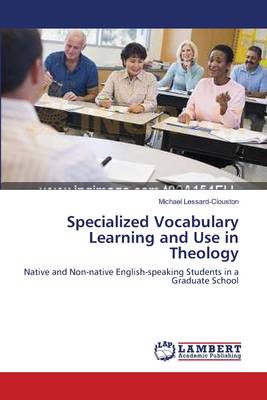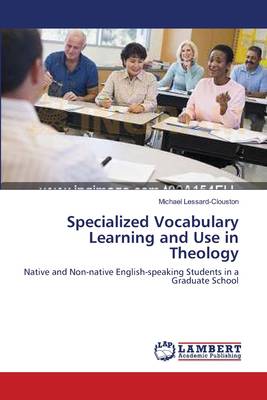
- Afhalen na 1 uur in een winkel met voorraad
- Gratis thuislevering in België vanaf € 30
- Ruim aanbod met 7 miljoen producten
- Afhalen na 1 uur in een winkel met voorraad
- Gratis thuislevering in België vanaf € 30
- Ruim aanbod met 7 miljoen producten
Zoeken
Specialized Vocabulary Learning and Use in Theology
Native and Non-native English-speaking Students in a Graduate School
Michael Lessard-Clouston
Paperback | Engels
€ 77,95
+ 155 punten
Omschrijving
While second language acquisition (SLA) research has grown significantly, one research gap concerns natural SLA in contexts other than ESL/EFL classes. One field with large numbers of ESL/EFL students is theology, and this book addresses this area by describing an investigation into 1) the specialized vocabulary of an introductory course at a graduate school of theology in central Canada and 2) the learning and use of this theological vocabulary by both native and non-native English speaker participants. Using various data sources, the book details how native and non-native English speakers approached and succeeded in learning the technical vocabulary of their discipline over one semester and provides corpus analyses of a) theology lectures as lexical environments and b) participants' written work in this context. This study delivers a systematic overview of issues in technical vocabulary and discusses implications for related theory, future research, and the learning and teaching of specialized vocabulary. The book, with samples of word lists and student writing, will therefore be of interest to theological students as well as ESL/EAP teachers and applied linguistics researchers.
Specificaties
Betrokkenen
- Auteur(s):
- Uitgeverij:
Inhoud
- Aantal bladzijden:
- 212
- Taal:
- Engels
Eigenschappen
- Productcode (EAN):
- 9783838304717
- Verschijningsdatum:
- 30/05/2010
- Uitvoering:
- Paperback
- Formaat:
- Trade paperback (VS)
- Afmetingen:
- 152 mm x 229 mm
- Gewicht:
- 317 g

Alleen bij Standaard Boekhandel
+ 155 punten op je klantenkaart van Standaard Boekhandel
Beoordelingen
We publiceren alleen reviews die voldoen aan de voorwaarden voor reviews. Bekijk onze voorwaarden voor reviews.











